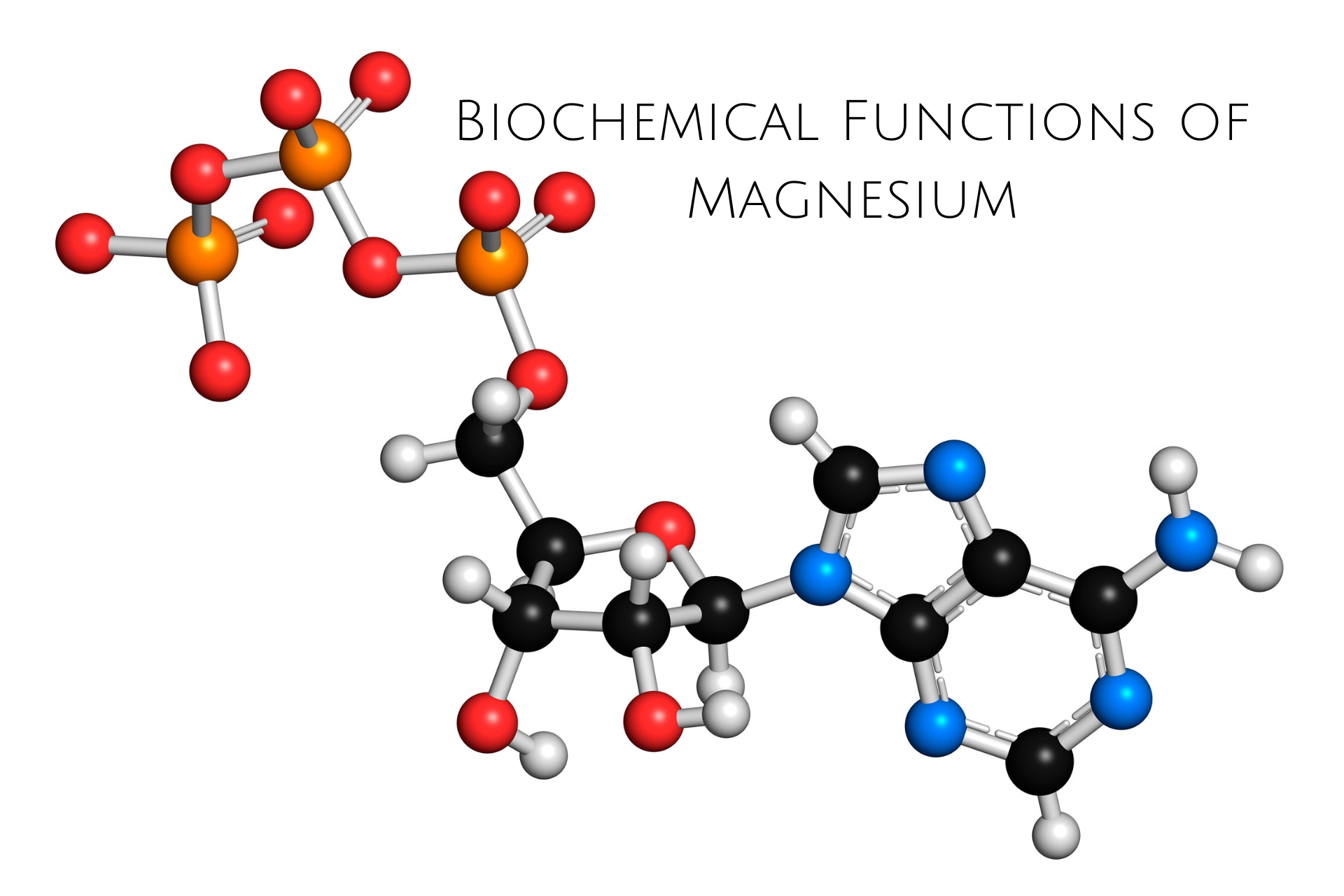Importance of Magnesium (Mg)
Introduction to Magnesium:

Magnesium (Mg) is an essential mineral found abundantly in the human body, second only to potassium. Its significance stems from its involvement in numerous biochemical processes crucial for maintaining overall health and well-being. Magnesium plays a pivotal role in enzyme activity, energy production, muscle function, bone health, cardiovascular regulation, and neurological processes. This comprehensive review aims to explore the multifaceted importance of magnesium in human physiology and health.
Biochemical Functions of Magnesium:

Magnesium serves as a cofactor for more than 300 enzymatic reactions within the body, participating in processes such as ATP synthesis, DNA replication, and protein synthesis. As a crucial component of ATP, the primary energy currency of cells, magnesium facilitates energy metabolism and cellular function. Furthermore, magnesium influences the activity of various enzymes involved in carbohydrate metabolism, lipid metabolism, and neurotransmitter regulation.
Muscle and Nerve Function:

Magnesium is indispensable for proper muscle contraction and relaxation. It regulates the movement of calcium ions across cell membranes, ensuring smooth muscle function and preventing involuntary contractions or spasms. In the nervous system, magnesium plays a role in neurotransmitter release and synaptic plasticity, affecting neuronal signaling and cognitive function.
Bone Health and Mineralization:

Magnesium is integral to bone health, contributing to bone density and strength. It interacts synergistically with calcium and vitamin D to support bone mineralization and prevent osteoporosis. Research suggests that magnesium deficiency may compromise bone integrity, increasing the risk of fractures and skeletal disorders.
Cardiovascular Regulation:

Magnesium plays a vital role in maintaining cardiovascular health by modulating heart rhythm, blood pressure, and vascular tone. It helps regulate the electrical impulses that govern cardiac contraction and relaxation, thereby reducing the risk of arrhythmias and heart disease. Additionally, magnesium promotes vasodilation, improving blood flow and reducing hypertension.
Blood Sugar Regulation and Insulin Sensitivity:

Magnesium influences insulin secretion and action, contributing to glucose metabolism and insulin sensitivity. Adequate magnesium levels are associated with improved glycemic control and reduced risk of insulin resistance and type 2 diabetes. Conversely, magnesium deficiency may impair glucose uptake and exacerbate metabolic dysfunction.
Anti-inflammatory and Antioxidant Properties:

Magnesium exhibits anti-inflammatory and antioxidant effects, mitigating oxidative stress and chronic inflammation. By scavenging free radicals and modulating inflammatory pathways, magnesium helps protect cells and tissues from oxidative damage and inflammatory disorders.
Stress Management and Mental Health:

Magnesium plays a role in stress management and mental health by regulating the hypothalamic-pituitary-adrenal (HPA) axis and modulating neurotransmitter activity. It acts as a natural relaxant, alleviating anxiety, depression, and mood disorders. Magnesium supplementation has been shown to improve sleep quality, reduce stress levels, and enhance cognitive function.
Dietary Sources and Nutritional Considerations:

While magnesium is present in a variety of foods, including leafy greens, nuts, seeds, whole grains, and legumes, dietary intake may not always meet recommended levels. Factors such as soil depletion, food processing, and lifestyle habits can contribute to magnesium deficiency. Therefore, supplementation may be necessary to ensure adequate magnesium intake, especially for individuals at risk of deficiency.
Clinical Implications and Therapeutic Applications:

Magnesium supplementation has been investigated for its therapeutic potential in various medical conditions, including cardiovascular disease, diabetes, migraine, and neuromuscular disorders. Clinical trials have demonstrated promising results regarding the efficacy of magnesium in disease prevention and management. However, further research is needed to elucidate optimal dosing, formulation, and long-term outcomes.
What if magnesium deficiency occur:

Magnesium deficiency is known as a decrease in total body magnesium content. Recommended daily allowance of magnesium is 420 mg for males and 320 mg for females.Hypomagnesemia, categorized by a total serum magnesium concentration below 1.8 mg/dl, is typically classified as mild (1.5 to 1.8 mg/dl), moderate (1 to 1.4 mg/dl), or severe (less than 1 mg/dl).It can occur due to various factors, including inadequate dietary intake, gastrointestinal disorders that impair magnesium absorption, excessive loss of magnesium through urine or sweat, or certain medical conditions or medications that interfere with magnesium metabolism.
Hypomagnesemia is typically defined as a total serum magnesium concentration below 1.8 mg/dl and is categorized as mild (1.5 to 1.8 mg/dl), moderate (1 to 1.4 mg/dl), or severe (<1 mg/dl).
Serum magnesium levels do not fully correlate with total body magnesium levels given that the different compartments that magnesium is found in do not easily equilibrate like sodium does. Thus normal magnesium levels in patients where hypomagnesemia would be expected may still need magnesium supplementation, such as in cases of hypocalcemia,hypokalemia,malnutrition.
In conclusion, magnesium is a vital micronutrient with far-reaching implications for human health and physiology. Its diverse roles in enzymatic reactions, muscle function, bone metabolism, cardiovascular regulation, and neurological processes underscore its indispensability for overall well-being. Understanding the importance of magnesium and implementing strategies to maintain optimal levels are essential for promoting healthspan and reducing the burden of chronic disease.
This comprehensive review underscores the significance of magnesium as a fundamental element in human physiology and underscores the need for further research to explore its therapeutic potential and clinical applications.
Recent Posts
-
The Future of Fitness: Aligning Your Workout and Nutrition with Your DNA
Fitness has always been a journey toward better health, performance, and wellbeing. For years,
-
Hacking the Brain: The Future of Brain-Computer Interfaces (BCIs)
Imagine a world where you can send an email just by thinking about it, regain lost motor functions a
-
Fatigue and Poor Sleep: How Your Gut Health Can Affect Energy Levels
Introduction In our fast-paced world, fatigue and poor sleep have become common issues affecting mil





